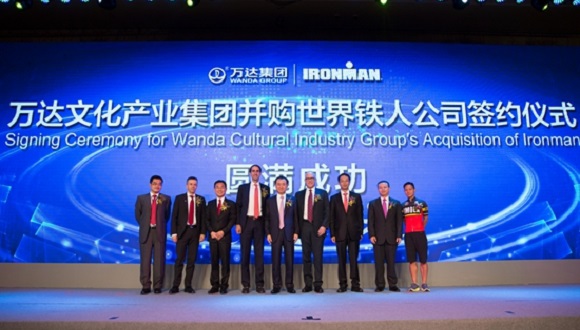While the Vuelta a España and the run-up to the Richmond world championships capture the headlines right now, news of a recent business transaction in China has significant repercussions for pro cycling. Dalian Wanda, a Chinese investment firm, has just purchased the World Triathlon Corporation (WTC) from Providence Equity Partners for a total value of about $900 million. The Chinese firm already has an anchor in sports, owning the Atletico Madrid soccer club and the leading marketing agency, Infront Sports.
Why should pro cycling care that one of China’s richest men has essentially just purchased an entire global sport? There are clearly some key differences, but triathlon mirrors pro cycling in many respects. There is an International Triathlon Union to govern the sport’s rules, similar to cycling’s UCI, and the WTC, which holds the licensing and oversight of all Ironman events, has a similar scope of power and influence as Amaury Sport Organisation (ASO) in cycling. Just as ASO has long been the financial nucleus of cycling, WTC has dominated the explosive growth of triathlon.
Dalian Wanda now has access to more than a quarter-million licensed triathlon participants, and is well-positioned to spur innovation and capitalize on a global marketing initiative to grow the sport even further. Ironman already has rock-solid and protected intellectual property rights, which includes the right to host its own world championship in Kona, Hawaii. It has a proven monetization model and virtual control of the sport’s strategic direction.
On the other hand, pro cycling is still as financially fractured and economically unsustainable as it was 50 years ago. There is no consolidation of events into a coherent business structure, and only a small handful of top-level WorldTour events make any money at all. This financial uncertainty and lack of coherent exposure puts the sport in a perpetually unstable situation. Sponsors whose teams don’t make the cut for the single iconic and profitable event — the Tour de France — are quick to exit. Teams and races come and go with alarming regularity.
Cycling and triathlon both appeal to a similar and often overlapping higher-income clientele of economically prosperous people focused on a healthy lifestyle — and there are many potential sponsors out there who want to sell products or services to that demographic. One of the keys to the WTC deal is that the Ironman brand is so strong that global sponsors will compete to tap into that market. Cycling typically has to take whatever short-term sponsors it can get.
Cycling’s leaders should take notice of the WTC deal, and how triathlon — barely 40 years old — has been able to expand so rapidly. Even a few years ago, no one would have predicted that the Ironman brand would be sold for nearly a billion dollars. The entire and still largely feudal sport of cycling — now well over 100 years old – could likely be acquired and consolidated for considerably less than that.
Could a Dalian Wanda or some other investor like recently-formed Virgin Sport swoop in and consolidate pro cycling? Could someone buy ASO’s portfolio of cycling races? The answer is yes, and it may only be a matter of time until someone decides to pull that trigger — someone who understands the true potential of cycling and is willing to gamble on a grander vision for the future than today’s leaders. The UCI and ASO should consider recent plans to unify pro cycling’s greatest properties into a single cohesive racing league — creating greater economic stability for teams, a more logical and competitive structure, and a media content monetization model which would enable revenue sharing, resulting in stronger overall growth potential for the sport.
It’s now a safe bet that someone will eventually jump at that opportunity.
Taken from Velo News
